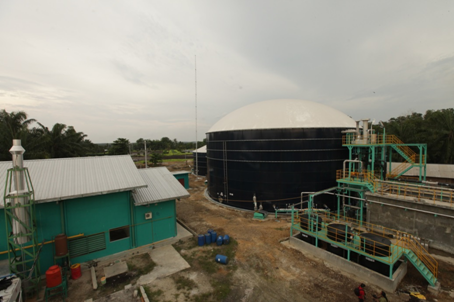 Asian Agri, founded by Indonesian Sukanto Tanoto, has constructed biogas plants to produce its own self-sufficient power while at the same time eliminating by-product waste from its palm oil plantations. These plants are situated in North Sumatra (two power plants), Riau (two power plants) and one power plant in Jambi. Currently two of the five existing biogas plants are under construction; however these should be completed and operational during the next year.
Asian Agri, founded by Indonesian Sukanto Tanoto, has constructed biogas plants to produce its own self-sufficient power while at the same time eliminating by-product waste from its palm oil plantations. These plants are situated in North Sumatra (two power plants), Riau (two power plants) and one power plant in Jambi. Currently two of the five existing biogas plants are under construction; however these should be completed and operational during the next year.
Asian Agri is an affiliate of the RGE group of companies which operate with the belief that all operations should be good for the community, good for the country, good for the climate and good for the company, set by the founder and chairman of RGE, entrepreneur and philanthropist Sukanto Tanoto.
The biogas power plants run on palm oil mill effluent (POME) left over from the processing of crude palm oil, and are therefore situated near Asian Agri palm oil mills. Their product waste is filtered before being inserted into large tubes and heated to a temperature between 52-55 degrees Celsius, which causes the biogas to be released. The Biogas is then used to drive the turbines which in turn generate electric power.
Each biogas plant has the capacity to produce up to 2 megawatts (MW) of electricity, and as the plants each use only 700 kilowatts for operational purposes, this leaves an excess of 1.3 MW per plant. Asian Agri is in talks with state electricity company Perusahaan Listrik Negara (PLN) to sell the excess electricity to them. On average a simple household in Indonesia uses 90 watts, which means the excess electricity created by the biogas plants can power more than 7000 homes.
The biogas plants are equipped with the newest state of the art Japanese digester tank technology, which accelerates and maximises the process of forming methane gas, an essential element of power generation. This process results in a 60% reduction in greenhouse gas emissions compared to the conventional practise of treating the POME in an open system.
Greenhouse gas calculations of the plants are carried out annually, and the results are independently audited for the International Sustainability and Carbon Certification. The results are used by Asian Agri to monitor emissions from its biogas power plants, and help identify ways to sustainably improve greenhouse gas emissions.